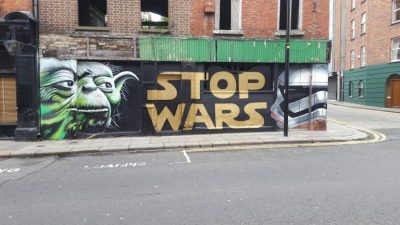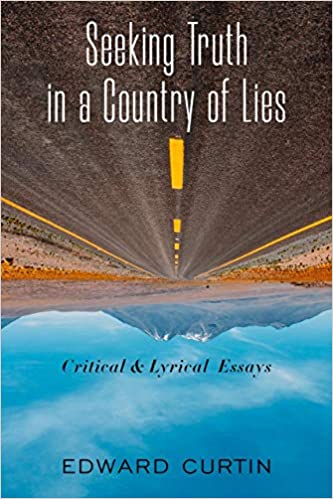“War and Peace Absurdly Juxtaposed”, Who Knew: We’re Here Because We’re Here Because We’re Here Because We’re Here

All Global Research articles can be read in 51 languages by activating the Translate Website button below the author’s name.
To receive Global Research’s Daily Newsletter (selected articles), click here.
Follow us on Instagram and Twitter and subscribe to our Telegram Channel. Feel free to repost and share widely Global Research articles.
***
My title comes from a song sung by soldiers as they marched to hell in the trenches of World War I and the same song my sisters and I sang in the car as our parents drove us to our summer vacation in paradise at Edgewater Farm.
I think of this as we march to WW III.
The soldiers, who would be slaughtered by the millions as pawns in the great game, sardonically sung it to the tune of Old Lang Syne to express their bewilderment at why they were fighting in the so-called “War to End All Wars” or “the Great War.”
We children sang it because we had heard the words but had no idea where they came from, yet they seemed playful and weird and easy to remember and we were celebrating our good fortune in leaving the city and arriving at the farm for a week’s country idyll.
War and peace absurdly juxtaposed. Because? Because everyone needs to be somewhere even if they don’t know why.
Yet today so many people feel lost in a world gone mad, a nowhere land, far further from somewhere than when John Lennon penned the words to “Nowhere Man” in 1965. It is no wonder he was assassinated in 1980, for he was a man growing into a profound anti-war consciousness.
Now we’re again celebrating Armistice/Remembrance/Veteran’s Day on November 11 in a world forever at war and with nuclear annihilation staring us in the face. Always the bitter Old Lie told by the depraved political and economic elites to suck the masses into death. Wilfred Owen, killed in action on November 4, 1918 one week before the Armistice, murmurs to us from his French grave:
Dulce et Decorum Est
Bent double, like old beggars under sacks,
Knock-kneed, coughing like hags, we cursed through sludge,
Till on the haunting flares we turned our backs,
And towards our distant rest began to trudge.
Men marched asleep. Many had lost their boots,
But limped on, blood-shod. All went lame; all blind;
Drunk with fatigue; deaf even to the hoots
Of gas-shells dropping softly behind.
Gas! GAS! Quick, boys!—An ecstasy of fumbling
Fitting the clumsy helmets just in time,
But someone still was yelling out and stumbling
And flound’ring like a man in fire or lime.—
Dim through the misty panes and thick green light,
As under a green sea, I saw him drowning.
In all my dreams before my helpless sight,
He plunges at me, guttering, choking, drowning.
If in some smothering dreams, you too could pace
Behind the wagon that we flung him in,
And watch the white eyes writhing in his face,
His hanging face, like a devil’s sick of sin;
If you could hear, at every jolt, the blood
Come gargling from the froth-corrupted lungs,
Obscene as cancer, bitter as the cud
Of vile, incurable sores on innocent tongues,—
My friend, you would not tell with such high zest
To children ardent for some desperate glory,
The old Lie: Dulce et decorum est
Pro patria mori.
But what do dead poets know? Only everything important.
What child would want such gory glory as dulce et decorum est pro patria moriun less it was pounded into its head by men in love with death?
Do they think the dead can hear the cheers?
Can we hear the songs of the poets who link us back to contemplate the atrocities of the battles of The Somme, Passchendaele, Marne, Gallipoli, Verdun, etc. with all the official lies told by the political jackals responsible for these slaughters?
At the farm, my many sisters and I, despite not knowing what we had sung, did know why we were where we were; our “because” had a clear answer. We were there to choose life, not death, to enjoy living, which we knew was a precious gift from parents who could barely afford the expense. We walked barefoot down the sandy dirt road between the green pasture where the cows lolled dreamily and the quiet waters of the limpid creek to the swimming hole where we would float for hours with the fish as turtles eyed us from their log perches in the sun.
What child would want to wallow in blood and gore for a posthumous medal?
What parent would want their child to march to war to die, rather than swim in the waters of life and love?
We’re here because we’re here because nihilism is celebrated as patriotism and the love of death masquerades as love of life. The nations that celebrate these war days do not do so to foster peace but to remind people that it is indeed sweet to die for one’s country. And God too, of course. Because? The poet Dylan sings the truth. Just listen: “With God on Our Side” or hear Phil Ochs’ “Is There Anybody Here.”
But all of this was once upon a time in the 1960s when many people were realizing that war was a racket, as Marine General Smedley Butler told us long ago. Today sleep has descended on most people while the disease of war is injected into the public’s bloodstream in a manner learned well from the massive propaganda campaign of WW I. In the USA then, it was the Committee on Public Information, led by George Creel, Edward Bernays, Walter Lippmann, et al. who “manufactured the consent” of the public to hate the “Huns,” keep their mouths shut, and spy on their neighbors, all in the service of a jolly-good war “over there.” Today the spying and propaganda apparatus dwarfs those efforts exponentially with its electronic, digital technology.
But poets don’t text the truth. They sing it and think it and tell it, even when nobody’s listening.
We’re all lucky to still be here. If we continue to celebrate past wars and the soldiers who fought them in a sly homage to the greatness of war, we are doomed. We won’t be here because….
Here’s Liam Clancy singing of one man’s story of war’s greatness.
*
Note to readers: Please click the share buttons above. Follow us on Instagram and Twitter and subscribe to our Telegram Channel. Feel free to repost and share widely Global Research articles.
This article was originally published on the author’s blog site, Behind the Curtain.
Edward Curtin is a prominent author, researcher and sociologist based in Western Massachusetts. He is a Research Associate of the Centre for Research on Globalization (CRG).
Featured image is from Free the People
He is the author of Seeking the Truth in a Country of Lies
To order his book, click here.
“Seeking Truth in a Country of Lies is a dazzling journey into the heart of many issues — political, philosophical, and personal — that should concern us all. Ed Curtin has the touch of the poet and the eye of an eagle.” Robert F. Kennedy, Jr.
“Edward Curtin puts our propaganda-stuffed heads in a guillotine, then in a flash takes us on a redemptive walk in the woods — from inferno to paradiso. Walk with Ed and his friends — Daniel Berrigan, Albert Camus, George Orwell, and many others — through the darkest, most-firefly-filled woods on this earth.” James W. Douglass, author, JFK and the Unspeakable
“A powerful exposé of the CIA and our secret state… Curtin is a passionate long-time reform advocate; his stories will rouse your heart.” Oliver Stone, filmmaker, writer, and director


